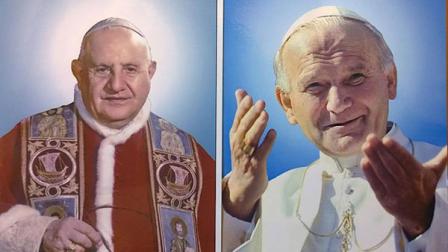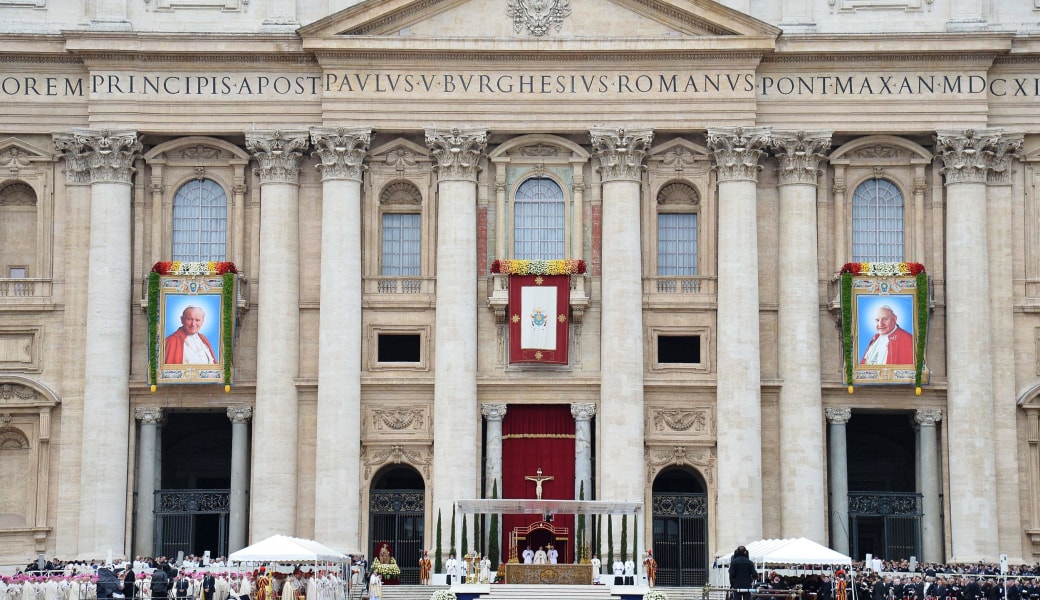
Posted on 04/27/2014 7:23:53 AM PDT by Salvation

April 25, 2014 (WPVI) -- On Sunday, when Pope Francis presides over the dual canonization of Popes John Paul II and John XXIII he will be following a long established process.
Being named a saint is, usually, the end of a four-step process.
First, after the candidate's death, someone needs to begin gathering the evidence to support sainthood, and then present that to the Vatican's Congregation for the Causes of Saints.
------------
, it turns the candidate's name over to the Pope who proclaims the candidate "venerable."
-------------
The next step is the investigation of possible miracles attributed to the candidate. These usually involve the healing of someone
-------------
and forward the candidate's name to the pope for beatification
-------------
It takes a second miracle to be canonized... usually. After canonization, the candidate can be called "saint."
(Excerpt) Read more at abclocal.go.com ...
Isn’t this where the “DEVIL’S ADVOCATE” stepped in?
ABC?
It wasn’t a very detailed article; just enough facts for all.
Sainthood ping!
I just heard on the news that the litany of saints included ALL the saints of the Catholic Church.
People don’t even know how ignorant they are.
For ABC, not a bad article.

The Church wrote, preserved and canonized the Scriptures, so She is aware of these passages.
Saints, broadly speaking, are those who follow Jesus Christ and live their lives according to his teaching. Catholics, however, also use the term narrowly to refer to especially holy men and women who, through extraordinary lives of virtue, have already entered Heaven.On this side of heaven, we cannot be absolutely certain of any particular person's salvation, unless that information is revealed by God and/or His Church, "the pillar and foundation of truth."Sainthood in the New Testament
The word saint literally means "holy," and, in the New Testament, saint referred to all who believed in Jesus Christ and followed his teachings. Saint Paul often addressed his epistles to "the saints" of a particular city (see, for instance, Ephesians 1:1 and 2 Corinthians 1:1), and the Acts of the Apostles talks about Saint Peter going to visit the saints in Lydda (Acts 9:32). The assumption was that those who followed Christ had been so transformed that they were now different from other men and women and, thus, should be considered holy.
Practitioners of Heroic Virtue
Very early on, however, the meaning of the word began to change. As Christianity began to spread, it became clear that some Christians lived lives of extraordinary, or heroic, virtue. While other Christians struggled to live out the gospel of Christ, these people were eminent examples of the moral virtues, and they easily practiced the theological virtues of faith, hope, and charity.
The word saint thus became more narrowly applied to such people, who were venerated after their deaths as saints, usually by the members of their local church or the Christians in the region where they had lived, because they were familiar with their good deeds. Eventually, the Catholic Church created a process, called "canonization," through which such venerable people could be recognized as saints by all Christians everywhere.
Canonized and Acclaimed Saints
Most of the saints whom we refer to by that title (for instance, St. Elizabeth Ann Seton) have gone through this process of canonization. Others, such as Saint Peter and Saint Paul, received the title through acclamation, or the universal recognition of their holiness.
Catholics believe that both types of saints (canonized and acclaimed) are already in Heaven, which is why one of the requirements for the canonization process is proof of miracles performed by the possible saint after his death. Canonized saints can be venerated anywhere and prayed to publicly, and their lives are held up to Christians still struggling here on earth as examples to be imitated.
FYI, this is a caucus thread.
Beautiful photo
Therefore, scripturally speaking, the “saints” are the body of Christ, Christians, the church. All Christians are considered saints.
small ‘s’ saints, yes.
capital ‘s’ Saints — in heaven, canonized, etc. A little different meaning there.
While we are on earth, we are all sinners.
As you pointed out, though, evangelists and Paul used the word ‘saints’ in greetings, etc.
“Therefore, scripturally speaking, the “saints” are the body of Christ, Christians, the church. All Christians are considered saints.”
Yes, but there is more to Christianity than the literal word of the Bible. The Bible, after all, was written in languages that you most likely can’t even read. You, I, and just about everyone you know, rely on translations, lexicons, concordances, etc. Thus, over time, a word like “saint” can develop in how it is used. Today, we use “Saint” denote a saved person whose name is actually known to us. There’s no harm in that.
Sainthood by ACCLAMATION!
I had never heard of an "acclaimed" saint until now.
As I went through the lists of saints, I DID see the "acclaimed" saints.
Live and learn.
Then we had the Polish Pope and the Panzer Pope.
Someday, there might even be an American pope. What do you think?
Disclaimer: Opinions posted on Free Republic are those of the individual posters and do not necessarily represent the opinion of Free Republic or its management. All materials posted herein are protected by copyright law and the exemption for fair use of copyrighted works.